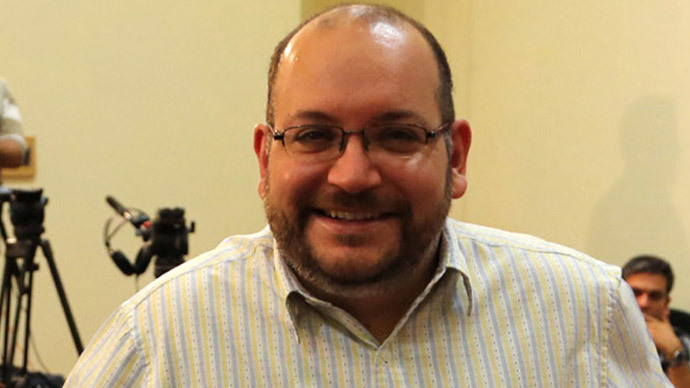Could Iran’s spy charges against US journalist put nuclear deal in jeopardy?

The US-Iran talks on the nuclear deal aren’t an indication of improving relations as the issue still has to be resolved, says researcher and writer Soraya Sepahpour-Ulrich, adding that the spy allegations are a different story and not related.
Relations between Washington and Tehran looked like they were warming earlier this month after a much-trumpeted nuclear deal was hammered out at P5+1 talks in Lausanne, Switzerland.
But now Iran-US relations seems to have taken a new turn as it was revealed that Iran has accused Tehran-based Washington Post journalist Jason Rezaian of several crimes, including "collaborating with hostile governments" and "propaganda", his lawyer said. Meanwhile, Washington has sent two warships to the shores of Yemen to intercept alleged Iranian arms shipments for Houthi rebels - something that the Pentagon denies.
RT asked independent researcher and writer Soraya Sepahpour-Ulrich whether the recent developments could impact the nuclear negotiations.
RT:Iran has charged US reporter Jason Rezaian with espionage following nine months of detention. What do you make of the timing?
Soraya Sepahpour-Ulrich: I don’t know if the timing is that relevant. He had been arrested for a while and perhaps the Iranians were looking for any documents to back their suspicions. I can’t say whether this reporter is guilty or not, or whether he is innocent. But we know well that the US has always used spies who posed as journalists. During the Cold War this was a common practice and it has continued to do so.
In fact, a couple of years ago one of its most famous or infamous spy-journalists by the name of Austin Goodrich passed away and he was in the headlines of The New York times. So we know that the US does this. In 2003 they talked about influencing journalists to write what they want in Rumsfeld’s Information Operations Roadmap. The fact that this is a practice puts every journalist in danger because those who cooperate with the US and its spy agencies, they know what they are undertaking, but those who are genuine journalists are put at risk because of this. Whatever the case against this Washington Post journalist in Iran, I don’t have that information. But I can also understand the apprehension and the suspicion that surround journalists...
READ MORE:US beefing up naval presence off Yemen amid rising regional tensions
RT:What impact could the recent heightening of tensions have on US-Iran relations? The relations between two countries have been warming up, haven’t they?
SSU: I’m not too sure what US-Iran relations you were referring to here... I think having a conversation, having a dialogue is not an indication of warming up. They are speaking to each other because this nuclear issue needs to be resolved and they are not the only two. There are other parties to these negotiations. We can’t really include other topics in this nuclear negotiation deal. We can’t talk about the alleged spying of the journalist or Yemen or anything else. The talks that were held were specifically and only about the framework of the nuclear agreement.
RT:Could the recent nuclear deal with Iran be in jeopardy over this arrest?
SSU: The deal was in jeopardy from day one. We should look at far more serious consequences. There is Senator Lindsey Graham, who has said that there is 90 percent chance that he may run [for President], he is very influential. He said there is no way this deal will go through. Congress has made a point of wanting oversight over this deal. And we know from Netanyahu’s trip to the US, not only this past March, but on other occasions - that Congress is beholden to Israel. The deal does not look very good at all. This is probably the least of their problems. The more serious contentions are what US Congress will do on the part of the Israeli lobby.
RT:Could the US use the gradual lifting of sanctions as leverage on Iran in diplomatic disputes unrelated to Tehran's atomic program?
SSU: I don’t know if Iran would go with gradual lifting of sanctions, period. But as far as other accusations that have been waged against Iran by the US... we saw less than a week ago that with the stroke of a pen the US or Mr. Obama said that Cuba is no longer a state that sponsors terrorism. If this is done with the stroke of a pen you have to ask yourself: “Why would these accusations be made in the first place?”
We need to understand that US policy has been for a long time to use sanctions, human rights, and its war on terror and democracy promotion as foreign policy tools.It changes them back and forth. I don’t believe for a moment that the US unstated goals and even some stated goals have ever changed. It is just that they are using different tools to promote their end game.
MORE:
The statements, views and opinions expressed in this column are solely those of the author and do not necessarily represent those of RT.
The statements, views and opinions expressed in this column are solely those of the author and do not necessarily represent those of RT.












